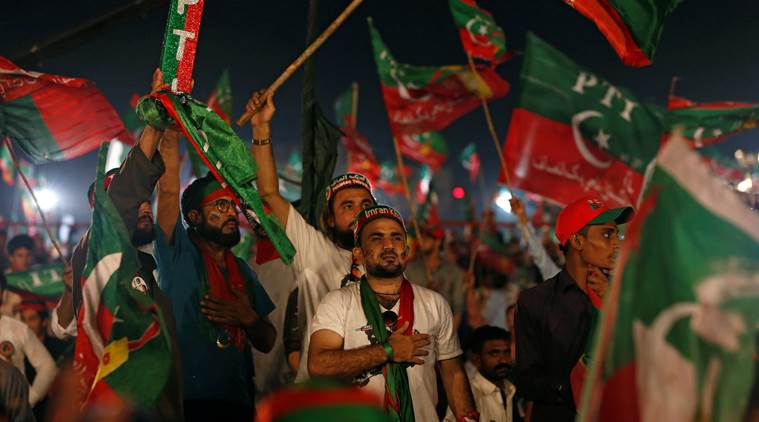View from the neighbourhood: After the polls
The Pakistan general election and its alleged misconduct, it appears, may find some parallel in Bangladesh.

PTI supporters during a rally in Karachi. The party has emerged as the largest political force in the city. (Reuters Photo)
Despite the Pakistan Tehreek-e-Insaf (PTI) emerging as the single-largest party in Pakistan’s National Assembly, and the likelihood of its chief Imran Khan becoming prime minister, a spectre hangs over the poll results. The July 29 editorial in The Nation points out that although international observers have “termed the elections credible. EU Chief Observer Michael Gahler raised his reservations on the overall political environment of the elections”. Essentially, the observations boil down to the fact that while the voting may have been largely fair, the pre-poll scenario and regulatory mechanisms “did not provide a level playing field” to many candidates and some political parties, notably to the Pakistan Muslim League-Nawaz (PML-N). “What PTI needs to do amid such criticism,” argues the editorial, “is to come up with a proper proposal on electoral reforms. PTI enjoys the public mandate, and after occupying the treasury benches, it should make the electoral reforms its top priority”.
An article in The Express Tribune on July 27 by Farrukh Khan Pitafi, a TV journalist in Pakistan, provides an interesting contrast to the liberal voice that decries the army and state and perhaps even a statist view. After congratulating Imran Khan, the author laments that rather than democratic government healing wounds, “In this decade, intolerance seems to have grown and society appears to have been divided into two irreconcilable wholes.” He blames this situation, a fall of Pakistan if you will, on two factors. The first is terrorism, which has taken over 70,000 lives “with literally countless injured and permanently disabled”. However, the political class has been unable to come up with a narrative to heal the wounds.
The second factor is the ineptness of politicians — an all-out attack on Nawaz Sharif: “Mian Sahib [Sharif] had no serious issues with the dynamics of civil-military relations, at least not visibly so, until Panama Papers case surfaced and became too hard to handle. The system kept throwing him lifelines. He repeatedly dropped the ball. Inquiry. TORs. Superior court’s dismissal of the petition. But Mian Sahib did not agree to a political solution.” The article then argues that while “not everyone has the patience to offer the political class endless opportunities” the “new government is in luck. It is trusted by many of our estranged brothers and sisters. When it comes to power, they feel empowered”.
Amid the fears of an “ultra religious right and militant right presence in Parliament,” there is also a welcome pioneer: “The election of Mahesh Kumar Malani, a Hindu candidate of the PPP, on a general seat from Tharparkar.” The editorial in Dawn on July 29 welcomes the elections of “the first Hindu candidate to be directly elected to the National Assembly since the reintroduction of a joint electorate system in 2002” as a “feel-good story from an election that has otherwise been blighted by controversy, allegations, violence and fear”. For women, the marginalised and non-Muslims, Pakistan politics has simply not been representative enough, argues Dawn. It also cautions that “mere numbers do not translate into true representation, and the country’s mainstream political parties should be encouraged to create meaningful space for all in national politics.”
Et tu, Bangladesh?
The Pakistan general election and its alleged misconduct, it appears, may find some parallel in Bangladesh. “The increasing number of election code violations we have seen in the campaigning of the three upcoming city elections is alarming,” says the July 27 editorial in The Daily Star.
The editorial lays the blame squarely at the feet of the country’s Election Commission: “We wonder why the EC should seek intervention of the Speaker to prevent lawmakers from campaigning instead of using its own wide powers to take appropriate actions. All this reinforces the notion that the EC is abdicating its responsibility to ensure free and fair elections.” A slew of reports in newspapers have “documented plenty of instances of election rule violations for the last few days in the three cities — Rajshahi, Sylhet and Barisal. From Upazila chairman to lawmakers, city corporation mayor to other influential public office holders are campaigning for the ruling party-backed candidates.” The editorial laments that “the EC is accorded with immense poll-time powers. It’s frustrating that the commission has so far been unwilling to assert its own authority”.
A weekly look at the public conversations shaping ideas beyond borders — in the Subcontinent. Curated by Aakash Joshi.
For all the latest Opinion News, download Indian Express App
More From Aakash Joshi
- Politics without close-upsVisual vocabulary of no-confidence debate did not allow for larger-than-lifeness ..
- Forwarded as Received: That’s a SportRahul baba may not be a good politician, but no matter, says WhatsApp uncle. His heart is in the right place...
- Forwarded as Received: For Whom the Boys TrollWhatsApp Uncle says the world isn’t a football field, and, when it comes to the nation, no one should be caught off-side ..







































No hay comentarios:
Publicar un comentario